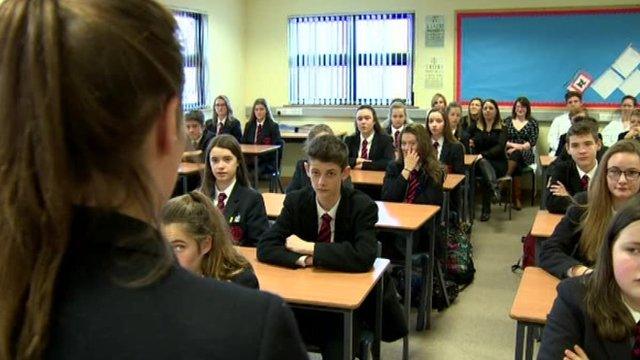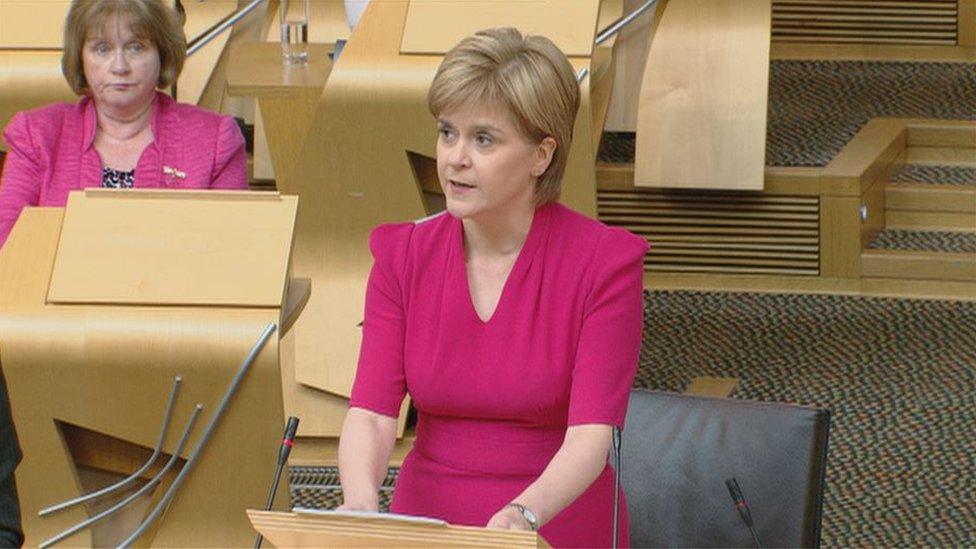OECD passes judgement on Scotland's Curriculum for Excellence
- Published

Achievement levels are spread "relatively equally", the OECD report said
Achievement in Scottish schools is above international averages - but the gap is narrowing, a review has found. , external
Particular concerns were raised about maths where performance has fallen from high to average over the past decade.
The review of the Curriculum for Excellence (CfE), external was undertaken by the Organization for Economic Cooperation and Development (OECD).
The international experts said CfE was at a "watershed moment" and changes could deliver a world class system.
The curriculum has been operating in schools since 2010 and gives teachers more flexibility over what and how they teach.
The OECD review, commissioned by the Scottish government, focused on the "broad general education" element of the curriculum up the age of 15 and found "much to be positive about", including;
levels of academic achievement are above international averages in science and reading (as measured by the Programme for International Student Assessment, PISA) and close to average in maths
achievement levels are spread relatively equally
Scottish schools do very well on measures of social inclusion and mix. Immigrant children generally perform better than their non-immigrant peers
a large majority of students feel positive about their school and teachers
nine in 10 school leavers enter a "positive follow-up destination" and two thirds stay in education
and teenage smoking and alcohol consumption have fallen and teachers say disruptive behaviour is in decline
The review team also highlighted some "problems and challenges", including;
a fifth of schools are rated only "satisfactory" and one in 10 is "weak or unsatisfactory"
there have been declining relative and absolute achievement levels in maths
recent data suggests there are smaller relative numbers of top reading performers among primary and secondary students - and large numbers of low performers in secondary schools.
positive attitudes to school drop off sharply at secondary level
and it said more should be done to improve assessment and tackle low performing schools.
The CfE aims to give learners a "holistic understanding" of what it means to be a young Scot growing up in today's world.
It aims to equip learners with four key "capacities" - successful learners, confident individuals, responsible citizens, and effective contributors.
However, the report noted there was still some confusion about what constitutes the CfE and suggests setting out clearer definitions.
Assessment concerns
It also highlighted concerns from school inspectors that assessment results are often not used to improve pupils' learning progress - and a lack of clarity over what should be assessed.
The experts concluded: "Current national assessment arrangements in Scotland do not provide sufficiently robust information, whether for system-level policy-making, or for local authorities or an individual school."
The report notes that these problems may be remedied by the new system of national testing announced recently by the first minister.
The experts called for more academic research into how the curriculum is being implemented and suggest it be less centrally managed, with a greater role for schools themselves and local authorities.
They added: "To achieve the full potential of CfE, building on the valuable consensus and the clear enthusiasm, and for this watershed moment to be 'take off point' there is a more ambitious theory of change needed."
Scotland's largest teaching union, EIS, said the report painted a "largely positive picture" of Scottish education.
General secretary Larry Flanagan said: "It confirms previous data that indicates that Scottish schools and levels of pupil attainment compare well both internationally and with other countries within the UK.
"It also highlights the well-established challenges facing Scottish education, including the poverty-related attainment gap that continues to have a negative impact on too many young people across the country."
'Great opportunity'
The Scottish government said it "broadly supported" the OECD recommendations - and said the review supported its plans to introduce national testing as part of its National Improvement Framework. , external
First minister Nicola Sturgeon said: "We share their view that we have a great opportunity to lead the world in developing an integrated assessment and evaluation framework.
"I firmly believe the Framework will play an important role in driving work to close the attainment gap and continually improve Scottish education."
Scottish Conservative young person spokeswoman Liz Smith said the review confirmed many encouraging signs including good levels of achievement in science and reading.
"However, it also confirms that there are major issues in numeracy and it sends out a very stark message about addressing failing schools,' she added.
"A range of recent statistics prove the extent of the attainment gap and the fact that literacy and numeracy are not as strong as they should be."
- Published16 December 2015

- Published8 December 2015

- Published24 November 2015

- Published1 September 2015
